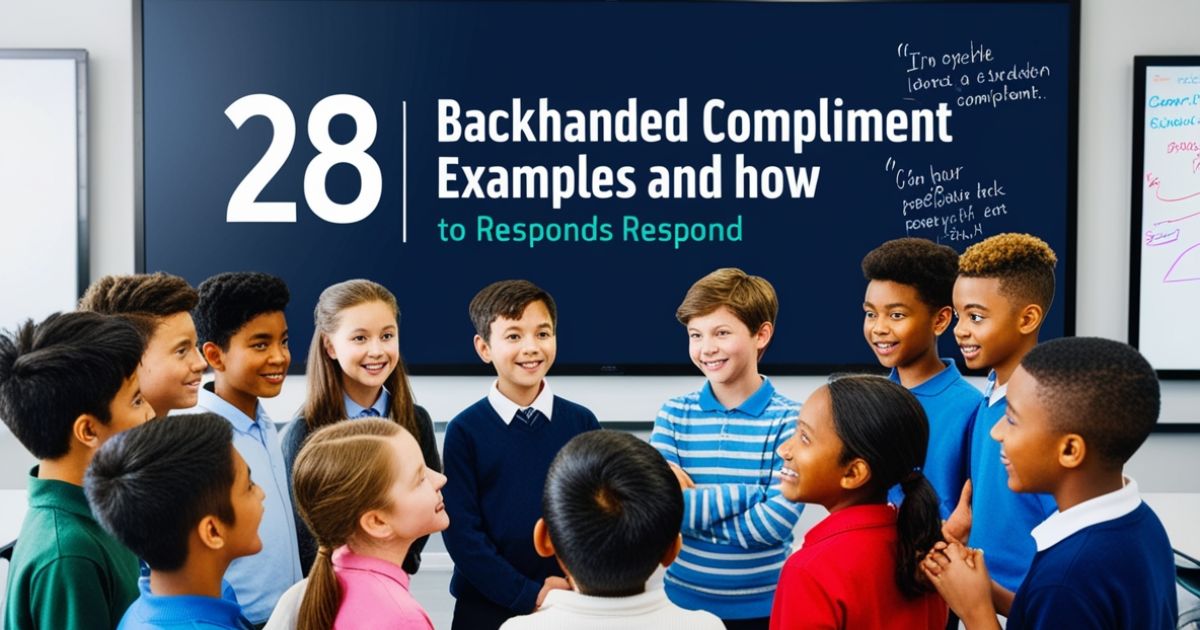28 Backhanded Compliment Examples and How to Respond
Have you ever received a compliment that felt more like an insult? If so, you’ve probably experienced what’s called a backhanded compliment. These are comments that, on the surface, seem like praise, but they carry an underlying insult.
We’ll dive into 28 backhanded compliment examples and how to respond to them in a way that maintains your confidence and composure. Whether it’s at work, at school, or with friends, learning how to handle backhanded compliments can help you navigate tricky social situations with ease.
What Are Backhanded Compliments?
A backhanded compliment is a remark that combines praise with a hidden insult. It may appear flattering at first, but upon closer inspection, it’s actually a way to undermine or criticize someone. These comments often stem from insecurity, jealousy, or even frustration.

Sometimes, they are intentional, while other times, they might be made without realizing the harm they cause.
Why Do People Give Backhanded Compliments?
Backhanded compliments can come from various sources. Often, they arise from:
- Insecurity: The person may feel threatened by your success or appearance.
- Jealousy: They may want to tear you down to feel better about themselves.
- Unawareness: Sometimes, people don’t even realize they’ve said something hurtful.
- Humor: In some cases, backhanded compliments are meant as jokes, though they can easily miss the mark.
28 Backhanded Compliment Examples
Now that we understand what backhanded compliments are, let’s look at 28 real-world examples of backhanded compliments you might encounter. These examples will help you spot these types of comments when they happen to you.
1. “You clean up nice!”
- What it implies: This suggests you normally look untidy or unkempt.
- How to respond: Smile and say, “Thanks, I try to look my best when I have the chance.”
2. “You’re so pretty for someone who doesn’t wear makeup.”
- What it implies: It implies that your natural beauty is surprising or unexpected.
- How to respond: “I appreciate that! I love embracing my natural look.”
3. “I’m surprised you did so well on that presentation, I didn’t expect that from you.”
- What it implies: Suggests they had low expectations of your ability.
- How to respond: “I’m glad I exceeded expectations! It was a great learning experience.”
4. “Wow, you’ve lost so much weight! You look almost… normal.”
- What it implies: It suggests your previous appearance was not acceptable or was extreme.
- How to respond: “Thanks! I’ve been focusing on my health.”
5. “You’re really good at this for a beginner!”
- What it implies: Implies that people expected you to fail or not do well.
- How to respond: “I’m glad my hard work is paying off!”
6. “I didn’t know you were so smart.”
- What it implies: Suggests that they didn’t expect you to be intelligent.
- How to respond: “Thank you! I’ve been learning a lot recently.”
7. “You look great for your age!”
- What it implies: Implies that your age is typically associated with looking bad.
- How to respond: “Thanks! I’m feeling great these days.”
8. “You look better than I thought you would in that outfit!”
- What it implies: Suggests that they didn’t think the outfit would suit you.
- How to respond: “I’m glad you like it! I love experimenting with fashion.”
9. “I didn’t expect you to be so successful after all those setbacks.”
- What it implies: Suggests that they doubted your ability to succeed.
- How to respond: “It’s been a tough road, but I’m proud of how far I’ve come.”
10. “I didn’t realize you were so talented at this.”
- What it implies: Implies they didn’t think you had the skill or ability.
- How to respond: “Thanks! I’ve been practicing a lot.”
11. “You’re actually quite funny for someone so quiet.”
- What it implies: Suggests that quiet people aren’t expected to have a sense of humor.
- How to respond: “I guess I like to surprise people sometimes!”
12. “That’s a nice shirt! It’s very bold for you.”
- What it implies: Implies that you’re usually not bold or adventurous with fashion.
- How to respond: “I thought it was time for a change! Glad you like it.”
13. “I don’t think I’d ever be able to handle what you’re going through.”
- What it implies: Implies that your struggles are unusual or particularly hard.
- How to respond: “It’s been challenging, but I’m managing.”
14. “Wow, you’ve really improved over the years!”
- What it implies: Implies that you weren’t very good at something before.
- How to respond: “I’m glad to hear that! It’s all about growth.”
15. “You have such a unique sense of style!”
- What it implies: Implies that your style is unusual in a negative way.
- How to respond: “Thanks! I love expressing myself through fashion.”
16. “That’s a great idea, I never would have thought of it!”
- What it implies: Implies that they didn’t think you were capable of coming up with good ideas.
- How to respond: “I’m glad it’s helpful! I always try to think outside the box.”
17. “You’re pretty brave for wearing that.”
- What it implies: Suggests that the outfit is daring or risky.
- How to respond: “I like to push boundaries with my fashion choices.”
18. “You’ve come a long way since you started.”
- What it implies: Implies that you weren’t doing well before.
- How to respond: “I’ve worked really hard to get here!”
19. “Your hair looks nice today—what happened to it yesterday?”
- What it implies: Implies that your hair usually looks bad.
- How to respond: “Thanks! I’m glad it’s looking good today.”
20. “I didn’t expect you to be so creative.”
- What it implies: Implies they didn’t think you had a creative bone in your body.
- How to respond: “I love to think outside the box!”
21. “You did a great job at that—better than I thought you would.”
- What it implies: Suggests that they had low expectations for your success.
- How to respond: “I’m glad I exceeded your expectations!”
22. “You look great—did you lose weight?”
- What it implies: Implies that you didn’t look great before.
- How to respond: “I’ve been focusing on my health recently, thanks for noticing.”
23. “You’re really brave for speaking up in meetings.”
- What it implies: Suggests that you normally keep quiet or that speaking up is unexpected.
- How to respond: “I’ve learned that my ideas are worth sharing!”
24. “That’s a nice compliment coming from you!”
- What it implies: Implies that you don’t usually give compliments or have something valuable to say.
- How to respond: “I always try to give credit where it’s due.”
25. “Your cooking is surprisingly good!”
- What it implies: Implies that they didn’t expect your cooking to be enjoyable.
- How to respond: “Glad you liked it! I put a lot of love into it.”
26. “You’re really good at this for a woman.”
- What it implies: Implies that women are not typically good at the activity in question.
- How to respond: “I believe anyone can excel at anything, regardless of gender!”
27. “You look nice today, but you didn’t yesterday.”
- What it implies: Implies that you usually don’t look good.
- How to respond: “I’m glad you like how I look today!”
28. “You don’t act like someone who’s been through so much.”
- What it implies: Implies that people who have faced challenges should behave differently.
- How to respond: “I try to stay positive despite what I’ve been through.”
How to Respond to a Backhanded Compliment
Responding to a backhanded compliment can be tricky, but with the right approach, you can turn the situation around. Here are some strategies:
- Ignore it: Sometimes, the best response is no response at all. If you don’t want to engage, you can simply smile or nod.
- Acknowledge the positive: Focus on the positive part of the compliment and respond graciously. For example, if someone says, “You look great for your age,” you can say, “Thanks! I feel great, too.”
- Call it out: If you feel comfortable, you can gently call out the backhanded nature of the compliment. For example, “I appreciate the compliment, but I don’t think age should be a factor in looking great.”
- Stay polite: Sometimes, simply saying “thank you” and moving on is the best way to handle a backhanded compliment without escalating the situation.
How Motivation Works in the Brain
Motivation plays a huge role in how we respond to challenges, including dealing with situations like backhanded compliments. The brain’s reward system, which involves structures like the dopamine system, is key to motivation.
When we experience something positive or rewarding, dopamine is released, giving us a sense of satisfaction and reinforcing the behavior. When we face negative comments or challenges, the brain may react by triggering stress responses, but it’s important to stay resilient.
Understanding how your brain reacts to both praise and criticism can help you stay focused and motivated, even when you encounter backhanded remarks.
Conclusion
Backhanded compliments can be hurtful, but knowing how to respond can help you maintain your confidence and avoid letting them affect you. By understanding what a backhanded compliment is, recognizing examples, and learning how to respond, you can handle these situations with grace.
It’s not about the compliment itself, but about how you choose to react. Whether you decide to ignore it, acknowledge the positive part, or calmly address the insult, your response can help set the tone for the conversation.
FAQ
What is a backhanded compliment?
A backhanded compliment is a remark that seems like praise but has an underlying insult. It often combines flattery with a subtle negative comment.
Why do people give backhanded compliments?
People may give backhanded compliments due to insecurity, jealousy, or unawareness. Sometimes, they are intended as jokes, though they can be hurtful.
How should I respond to a backhanded compliment?
You can respond by ignoring it, acknowledging the positive part, calling out the insult politely, or simply saying “thank you” and moving on.
Are backhanded compliments always intentional?
No, sometimes people give backhanded compliments without realizing how hurtful they are. It’s important to assess the situation before reacting.







